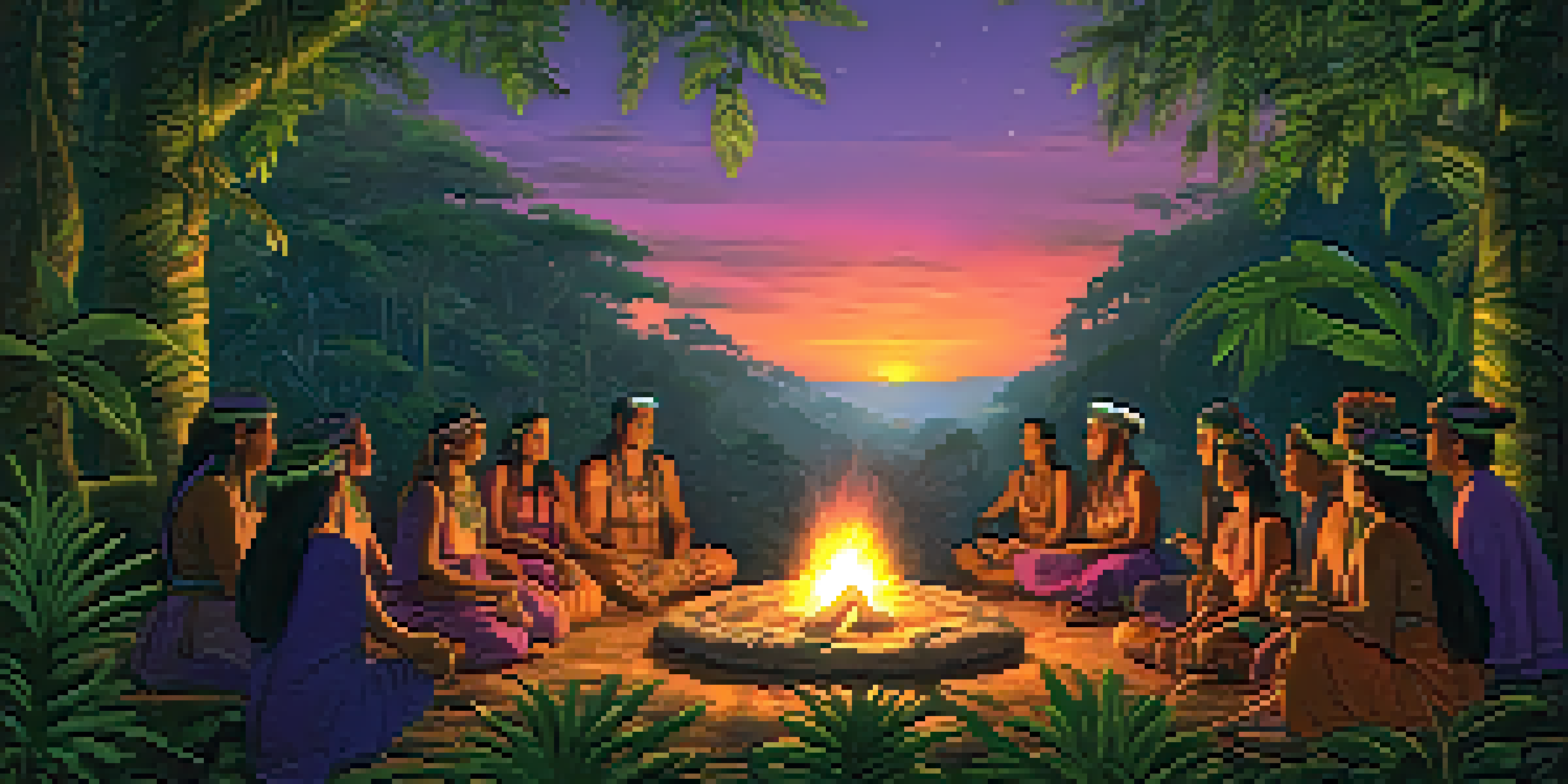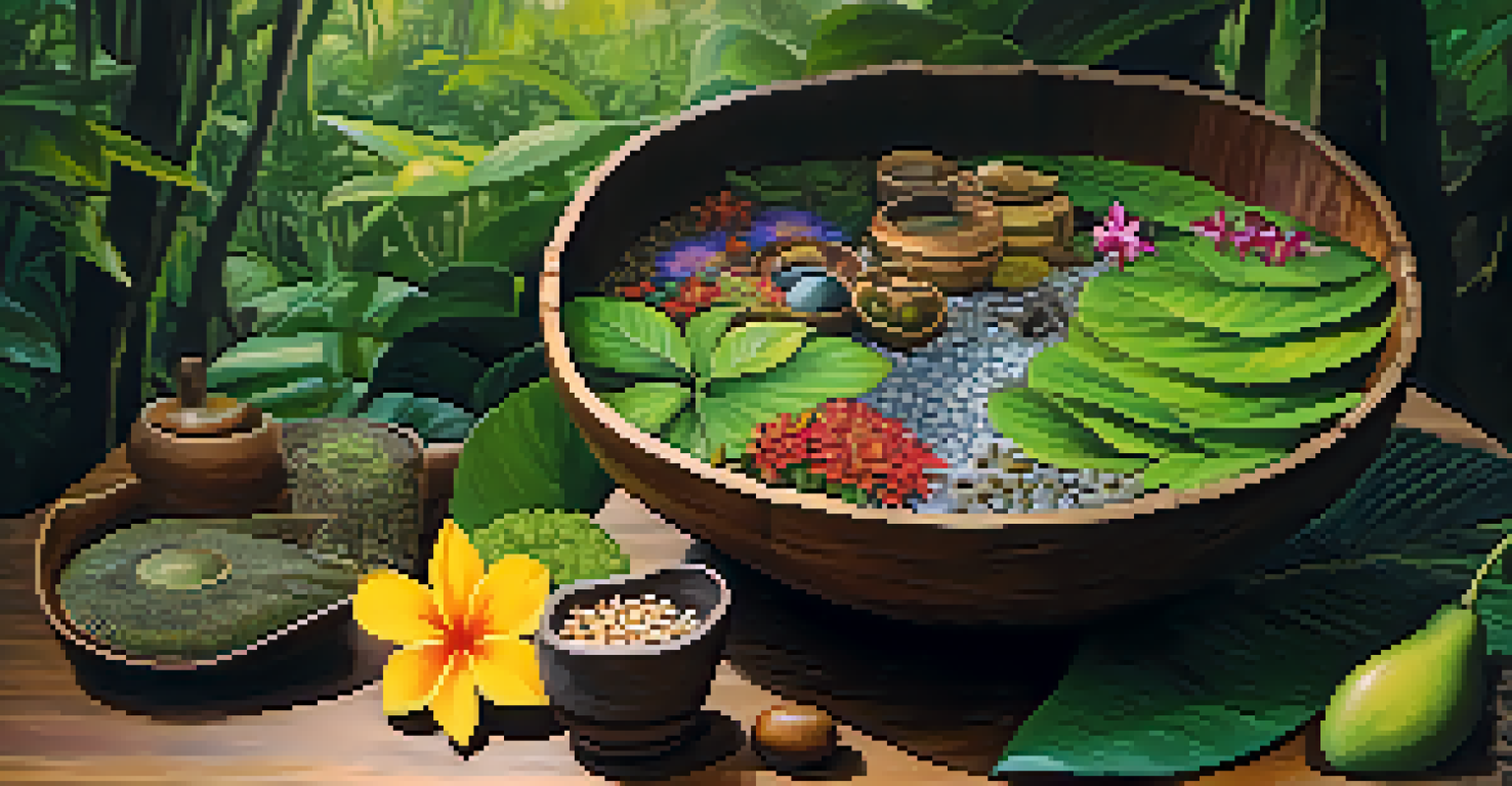Ayahuasca and Global Health Trends: A Cultural Perspective

Understanding Ayahuasca: Origins and Cultural Significance
Ayahuasca, a traditional brew made from the Banisteriopsis caapi vine and other plants, has roots in the Amazonian cultures of South America. This powerful drink has been used for centuries by indigenous tribes for spiritual and healing ceremonies. Its significance transcends mere consumption; it's a profound cultural ritual that connects the community with their ancestors and their environment.
Ayahuasca is a tool for personal transformation and healing, but it must be approached with respect for its cultural origins.
The drinking of ayahuasca often occurs in a ceremonial setting, guided by a shaman who leads participants through the experience. This communal aspect is vital, as it fosters a sense of belonging and shared purpose among participants. Many report transformative experiences, gaining insights that lead to personal and communal healing.
In recent years, ayahuasca has gained attention beyond its cultural origins, attracting individuals from around the globe seeking mental health support and spiritual growth. This intersection of traditional practice and modern wellness trends raises important questions about cultural appropriation and the ethics of such practices.
Ayahuasca in Modern Wellness: A Growing Interest
As mental health awareness grows, many people are looking for alternative therapies, which has led to an increased interest in ayahuasca. This ancient brew is often touted for its potential to alleviate symptoms of depression, anxiety, and PTSD. While scientific research into these claims is still emerging, anecdotal evidence suggests that many individuals find relief through their ayahuasca experiences.

Retreat centers dedicated to ayahuasca have sprung up in countries like Peru and Brazil, catering to international travelers. These centers often market themselves as places of healing, combining traditional practices with modern therapeutic approaches. However, this commercialization raises concerns about the authenticity of experiences and the potential exploitation of indigenous cultures.
Cultural Significance of Ayahuasca
Ayahuasca serves as a profound cultural ritual in Amazonian societies, connecting communities with their ancestors and promoting healing.
Moreover, the rise of social media has amplified interest in ayahuasca, with influencers sharing their transformative journeys. This visibility can encourage more people to explore ayahuasca as a healing modality, but it also risks oversimplifying the complexities of such deep, spiritual practices.
Cultural Appropriation vs. Cultural Exchange
The popularity of ayahuasca raises important discussions about cultural appropriation versus cultural exchange. While some argue that Western interest in ayahuasca can lead to the commodification of sacred traditions, others see it as an opportunity for mutual understanding and respect. It’s crucial to navigate these conversations with sensitivity and awareness.
The journey of ayahuasca is not just about the experience itself, but also about the integration of those insights into daily life.
Cultural appropriation often occurs when one culture exploits the symbols, practices, or traditions of another without understanding or respecting their significance. In contrast, cultural exchange can foster appreciation and collaboration, but it requires an ethical approach and acknowledgment of the source culture's contributions.
Engaging with ayahuasca responsibly means respecting its origins, supporting indigenous communities, and seeking knowledge from their traditions. This awareness can help ensure that the flow of ideas and practices is beneficial to all parties involved—rather than exploitative.
The Role of Ceremony in Ayahuasca Experiences
Ceremonies play a critical role in the ayahuasca experience, serving as a framework for participants to explore their inner worlds. Guided by experienced shamans, these rituals often involve singing, chanting, and other spiritual practices that enhance the experience. This structured environment helps in creating a safe space for emotional exploration and healing.
The ceremonial aspects also emphasize the importance of community and shared intention. Participants often report feeling a deep connection not only to their fellow attendees but also to the larger universe. This sense of unity can be a powerful catalyst for personal transformation, leading to insights that may not have emerged in isolation.
Modern Interest and Challenges
The growing popularity of ayahuasca as an alternative therapy raises concerns about cultural appropriation and the integrity of indigenous practices.
Furthermore, the integration of these experiences into everyday life is crucial for long-term benefits. Many retreat centers now offer integration workshops to help participants process their experiences and apply insights into their daily lives, reinforcing the therapeutic potential of ayahuasca.
Scientific Research: Validating Traditional Wisdom
As ayahuasca gains popularity, scientific research is beginning to catch up, exploring its effects on mental health and well-being. Studies suggest that compounds found in ayahuasca, such as DMT (dimethyltryptamine), can induce profound psychological insights and emotional healing. This growing body of research aims to bridge the gap between traditional wisdom and modern science.
However, rigorous clinical research is necessary to validate these claims fully. Studies often face challenges, such as small sample sizes and variability in individual experiences. Understanding the nuanced effects of ayahuasca is essential not only for scientific credibility but also for ensuring participants have safe and effective experiences.
As researchers delve deeper into ayahuasca's potential, they also emphasize the importance of cultural context. The benefits derived from ayahuasca may not solely stem from its chemical components but also from the cultural and communal practices surrounding its use.
Global Health Trends: Integrating Ayahuasca
The conversation around ayahuasca is part of a broader trend in global health that emphasizes holistic and integrative approaches. As people increasingly seek alternatives to conventional medicine, there’s a growing recognition of the value of mental, emotional, and spiritual well-being. Ayahuasca fits neatly into this paradigm as a tool that addresses multiple facets of health.
Countries like Canada and the United States are beginning to explore regulatory frameworks for psychedelics, including ayahuasca, as part of mental health treatment. This shift reflects a growing acceptance of the therapeutic potential of these substances, particularly in addressing the mental health crisis facing many societies today.
Future of Ayahuasca and Global Health
The future of ayahuasca in global health will depend on balancing respect for its cultural origins with its therapeutic potential in modern wellness.
Integrating ayahuasca into global health discussions opens up new avenues for research and treatment options. It invites a reevaluation of how we understand and approach mental health, inviting a more inclusive perspective that honors various cultural practices.
The Future of Ayahuasca in Global Health Discussions
Looking ahead, the future of ayahuasca in global health will likely hinge on balancing respect for its cultural origins with modern therapeutic applications. As interest continues to rise, it’s essential to foster dialogues that prioritize ethical practices and cultural sensitivity. This will help ensure that ayahuasca is approached as a valuable cultural heritage, rather than merely a trendy wellness fad.
Education will play a vital role in shaping the future of ayahuasca, both for practitioners and participants. Increasing awareness about the cultural significance, potential risks, and benefits of ayahuasca can lead to more informed decisions. This understanding can also empower indigenous communities, allowing them to share their knowledge and practices on their terms.

Ultimately, as we navigate the complexities of ayahuasca within global health trends, we have an opportunity to create a more inclusive and respectful framework that benefits both individuals seeking healing and the cultures that have safeguarded this sacred tradition for centuries.